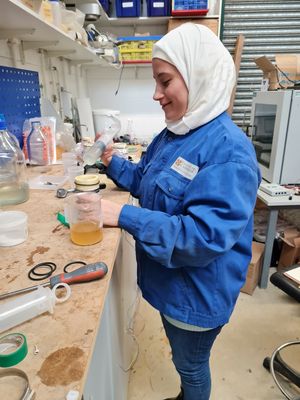Mechanized tunneling in naturally cemented granular soils - Influence of the destruction of bonding
The Research Project

An urgent demand for underground constructions is notably increasing due to the needs that must be met for the ever-increasing population. As a result, tunnels are being excavated in complex ground conditions, posing a great challenge to engineers. This research focuses on mechanized tunneling in naturally cemented soil and addresses the influence of the bonding breakage between soil particles. It is unclear so far how large this destruction is under tunnel-relevant boundary conditions and how cyclic loading influences the deformation at the ground surface or the stresses acting on tunnel liners. A still unsolved question is how high-cyclic loading caused by high-speed vehicles affects the partially destroyed bonding resulted during tunnel construction. Natural cementation is replicated in the lab using microbially induced calcium carbonate precipitation, a new, green, and economic bio-cement, in which bacteria metabolize urea to form calcium carbonate minerals that bond soil particles. In my research, I focus on studying the mechanical behavior of naturally cemented soil through conducting triaxial tests under different loadings conditions. The bonds destruction will be determined using a micro scanning analysis. A constitutive model describing the observed material behavior will be developed depending on the experimental results and will be implemented in a finite element program to simulate real tunneling problems in naturally cemented soils.
What I need the IRB for
What makes the IRB so desirable to me is the resilience it provides. In particular, this meets the criteria of my research nature. Multidisciplinary research requires multiple collaborations that assist the progress and cover diverse science aspects. The IRB provides me with resiliency in visiting a variety of target institutions within flexible timeframes throughout the Ph.D. period. This allows me to seize the opportunity of immediate participation in relevant scientific events and exploit the full potential of international research advances. Additionally, IRB is a priceless enrichment to my intellectual and network development.
IRB Funded Activities
Research stay at Cambridge University. October - November 2022
During the end of October and November 2022, I had the chance to visit the lab of Cambridge University for six weeks and gain knowledge from the leading experts there on MICP. This visit enabled me to gain a deep understanding of the process of bacteria cultivation. Throughout the tests I conducted there, I developed practical experience in studying the mechanical properties of MICP-treated soil. In addition to the technical expertise, being there allowed me to establish my desired international network at the professional and peer levels. For example, I worked side by side with scientists performing research both in Australia and Cambridge. Moreover, it was great to attend lectures from professors considered the progenitors and founders of geotechnical engineering. The entire experience in the UK was fruitful, beneficial to my research, and resulted in a priceless personal experience.



